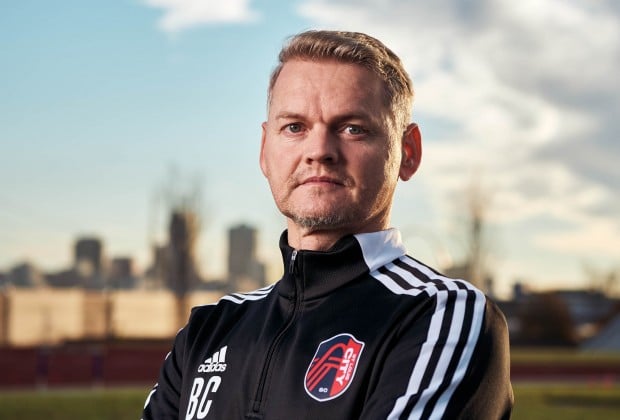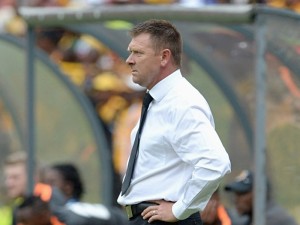A South African is spearheading one of the most remarkable stories in American Soccer writes Mark Gleeson in an exclusive from St Louis.
Tucked away in the Midwest, a quiet soccer revolution is fermenting in the United States, with strong South African overtones.
St Louis City, the latest expansion side in Major League Soccer, are wasting no time in trying to make up for the paucity of professional teams in a region that has strong soccer connections, and made a dream start to their first season – with a former Bafana Bafana international in charge and with a new signing from Kaizer Chiefs in the heart of the line-up.
Bradley Carnell’s first major coaching post has been a spectacular success story, just years from first starting out as an assistant coach at Free State Stars and then Orlando Pirates.
Njabulo Blom has also made a successful transition from Chiefs, where he was adept in both the right-back role and in the midfield, to a league with a much larger profile, and is settling into a key role.
Winning their opening five games this year was a record for an expansion franchise, marking an explosive start, and by the halfway stage of the season they were at the top of the Western Conference and well on their way to a post-season playoff berth.
St Louis City are Major League Soccer’s 29th franchise, continuing a steady stream of new entrants over the past years as the North American league continues to gather momentum and the continent looks ahead to the hosting of the 2026 World Cup.
The ownership group is headed by president Carolyn Kindle Betz – her grandfather Jack Taylor made billions in the car-hire business – and other members of the family, and is the first majority female-owned team in MLS. They built not only a $460-million stadium but also a $300-million training facility next door.
The process of putting together the club for the city was first mooted in 2015, but it was only in 2019 that it was formally announced as the MLS’s expansion franchise for 2023. Progress over the past 24 months has come at breakneck speed, starting with the appointment of sporting director Lutz Pfannenstiel, formerly at Bundesliga outfit Hoffenheim.
Pfannenstiel, 50, wanted to club to play in the hard-running, high-intensity style best associated with Ralf Rangnick and the Red Bull organisation, although there are no formal ties between the energy drink company and the team.
Carnell played under Rangnick at VfB Stuttgart and having been hired by New York Red Bulls as an assistant coach in 2017, was an obvious candidate.
“He was a terrier as a fullback and then he did a great job of being head coach for a short time on an interim basis in New York,” explains Pfannenstiel.
“He was for me the candidate number one, because I knew he could implement the philosophy we had our heads.”
Carnell, 46, arrived in St Louis 12 months before the team’s MLS debut, beginning the process of recruiting players and forming a team.
“People said to me ‘don’t do an expansion team, it’s the most thankless, worst job in the world and the most difficult job in American sports’,” he says, but he paid them no heed.
“The ownership group had the stadium and the training facility up and running long before the very first ball was kicked,” adds Carnell.
“If you look at that trajectory and that pathway, we did everything right. We began to bring seasoned pros from Europe on pre-contracts before the new season in 2023. It ensured they had time to settle and acclimatise, six months in advance.”
Despite all the talent, kicking off in February was daunting, Carnell recalls.
“We played the first game away against Austin, who had a fantastic second season of their existence in 2022. It is a very intimidating atmosphere. I sat on the chair in that first change-room meeting, and I said, ‘Boys, you know what the best feeling is here? It’s the feeling of being prepared.’ We’d been preparing for a full year plus three months.
“I get goosebumps thinking about it,” he says about the 3–2 win. “Very emotional, you know, the first three points in franchise history. It’s like a baby being born now. And we’ve just taken our first step, right away. To be part of that group, the feeling, the collectiveness, the unity that we had on the night.”
For Pfannenstiel, results easily exceed expectation. “We had no real goal when it comes to the position we wanted to finish in the first season,” he says. “Rather, the goal was to be competitive from day one. Everybody who comes here, we give them a game.
“But of course, you always have in the back of your mind that if things go well, we could sneak into the playoffs. But we never really had that as a clear goal. I say if we are in the contest for a playoff spot till three weeks before the end of the regular season, then we’ve done a good job in the first year.
“Most important is to organically build a sustainable football club, which doesn’t come in with a big bang and then disappears again.”





